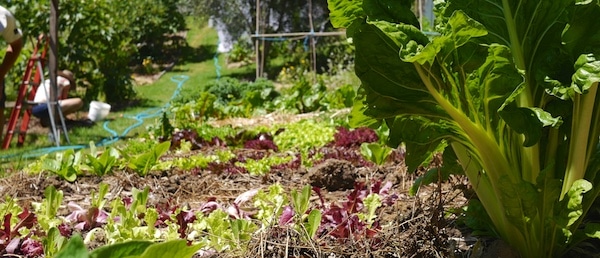
Popes produce is a small urban market garden in Woonoona, providing fresh veg and fruit to it’s surrounding community.
Bordered by lines of units, this little piece of urban farming paradise is sharing the goodness all around.
Popes Produce is Sarah + Ben Anderson, with assistance from their kids. Together they farm a long thin block of suburban land with a brick house up one end, a small forest up the other, and a creek in the middle.
On this land is a 400 m2 market garden, with fruit trees dotted all around, chickens, sugar cane, a cubby house, and a giant in-ground trampoline, the hole under which doubles as a community-scale fire pit circle.
In addition to growing food as an enterprise, this space also provides community garden plots for some of the neighbours in the clustered units over the fence, as well as a social pace for regular community gatherings. It’s a great example of permaculture + community done right.
Popes Produce – the stats:
- Rainfall: roughly 1400 mm per annum
- Growing: mixes salad leaves, edible flowers, herbs, veg, fruit
- Sales channels: direct via a vege box scheme, wholesale to local stores, cafes, restaurants and another box scheme
- Selling to: predominantly households within a 3km radius of Popes Produce H.Q., just a few customers further afield
Tell us about what led you here….
Back in 2010, we took a leap of faith – sold our home, packed our bags and took off with our 2 young children for a year of WWOOFing around the planet.
By the time we arrived back in Australia, we knew the goal was to find a good sized house block we could set up as a demonstration site to share the knowledge we had gained and display best sustainability practices within a local neighbourhood.
Ben has 20 years experience in environmental education and facilitation. Me – visual arts, hospitality and retail in the organic food sector. So we both love people and wanted to share ways to become more sustainable in our everyday lives.
We arrived back on new year’s day 2011 to perfect Sydney blue skies, family and friends to wrap our arms around and nowhere to live.
It’s a long story, but basically we found a spectacular block in Woonona stretching to the north with a modest but sturdy 3 bed home home, almost immediately.
Through swapping of stories, stretching of resources and a promise not to subdivide, we were told by the property’s guardians ‘you can have it’, resulting in grins all round from ear to ear, and a few tears of joy. We spent our first night in our new home on 17 January, just over two weeks after arriving back in the country.
The property had been in the same family for 100yrs, with a history of market gardening on site and in the neighbourhood.
And where exactly are you?
Geographically we’re in an awesome location on the foothills of the Illawarra Escarpment. The block stretches for 200m off to the north, it’s a hidden acre in suburbia. Only 2 km to the beach, and spread across a valley filled with beautiful ‘Bulli Black’ soil. We’ve 23 boundary neighbours & no vehicle access to the block.
What led you to start this enterprise?
The land itself & the incredible experiences we’ve had around the world – that skilled us up and inspired us to focus on this way of life when we returned home.
While the grass was still thigh high with no garden beds in sight, I decided (with no experience behind me) – I wanted to be a market gardener. Be outside, barefoot in the garden. Honest work with direct results.
Can you explain the enterprise model….
Popes Produce is growing it’s business model across a few platforms.
We harvest weekly for direct sales customers who have preordered for the month. This is our vege box pick up system.
Twice a week we harvest for our wholesale customers being a couple of local food retailers. (Flametree Food Co op & Manic Organic). Then a fortnightly harvest for a wholesaler who does a vege box delivery(The Vege Box) through the northern Illawarra.
Then there’s groups who hire our space as a demonstration site for workshops they run.
We are also building momentum with establishing our own series of workshops in collaboration with a local social enterprise education group (Wild Rumpus), and dipping our toes in the pool of consulting with people to establish their own edible gardens.
I’m aiming at right livelihood and providing a service to our greater community.
How often do you harvest?
We’re picking at least twice a week. At the beginning of the week we pick leafy greens, flowers and herbs for a wholesale customer and then on Thursdays we pick and pack for subscribers – this week they got the finest wonky carrots around, rhubarb, shallots, fennel, giant cucumbers, oregano, sage, lemon verbena (makes the best iced tea!), marigolds, green beans, mizuna, basil – the house always smells amazing on this day!!
What have you got in the ground at the moment….
Well, there’s a pumpkin going for garden domination, loads of fennel, carrots, basil, parsley, shallots, beetroot, corn, rockmelon, watermelon, crazy self sown golden nuggets (pumpkins) and loads of herbs… A few lettuces, mizuna, rocket, marigolds & calendula everywhere followed not too far behind by nasturtiums.
Just finished with a cracking crop of tomatoes grown from seed gifted to us from friend who was given them by an old Italian gardener, and some divine giant blood plums.
Oh yeah – and the figs have just started coming on (three varieties).
How do you decide what crops to plant?
I’ve given this significant thought and scribbles on paper!!! I’m currently working with a basic leaf, root, fruit, legume based rotation and not trying anything too exotic. First and foremost we’re endeavouring to build the soil and in turn it’s teaching us a lot in the process.
As I’m super new to growing (5 years of growing and this is our second year of market gardening) there’s a LOT of variables to take into account. Customers are welcome to submit their wish lists and we do our best.
Do you think you’d be doing this sort of project if it wasn’t for this particular land context?
Short answer – no. Along a similar path absolutely, location certainly plays a massive role.
I’ve been working with organic food in a retail context for the last 14 years, so I totally get happy food for happy planet means happy people. I believe we’re all running too fast these days and trying to achieve so much we don’t leave enough space in between for just being.
The amount of joy in sharing our space is pretty cool and I’m so glad we’re in a position to do so.
Tell us about the community garden aspect….
Well, we’ve got this amazing parcel of land, 23 boundary neighbours and no vehicle access. There are 10 townhouses on our Western side, and some of these neighbours have young kids and are really interested in growing some of their own food.
We have one neighbour in particular who brings over her scraps for the chickens & compost, chicken sits for us when we go away, her kids play on the trampoline & we’ve let them loose in their own garden bed right next to the fence.
Three other neighbours are planning their own beds, which will be up and running soon. We have taken down parts of the fence to provide easier access too.
We are really keen on good communication with our local community and through neighbours talking we’ve been able to jointly get rid of 5 giant privet trees whilst generating some work for a local arborist.
The arborist lives locally and gives us a call when he’s got good mulch, to date he’s helped out with around 15 tonnes of mulch! Thankfully our neighbours are kind enough to let the mulch truck come down their driveway and dump it over the fence. Wheelbarrowing a couple of tonnes of mulch off the road & down the hill as we used to do, was a real workout.
The ditch under the trampoline doubles as a fire pit on a semi regular basis for gatherings. Every other year we host Christmas drinks and invite the neighbours – many of whom haven’t met each other before our introductions, even though they’ve lived a stone’s throw from each other for the last 20 odd years.
How does living this way influence your kids do you think….
The kids think its normal to eat well, or go and pick your breakfast from the garden or to have a massive backyard full of adventure. It mostly sinks in when they have friends over and they see their mate’s reactions.
Of course they have a bunch of chores – letting the chooks out & putting them to bed, taking the compost out, washing up a bit, cooking a meal each week and that sort of thing, but they actually take great pride in it and we think their contributions give them a good sense of worth.
What’s the future plan for Popes Produce……
Fine tuning processes in the market garden. It’s so lovely to pick the goodness grown in front of you, experiment with recipes and swapping stories.
Running a few demonstrations/ workshops showcasing our enthusiasm and growing skill base to energise and empower people to have a go themselves.
We’ve also been dipping our toe into the pool of consulting with people that find starting an edible garden inspiring, but don’t know where to start.
So the future is very bright indeed. As long as the sun keeps shining, we’ll keep growing.
Thanks Sarah! You can follow Popes Produce via their blog, instagram or facebook. Or, if you’re near Woonoona, get in touch and get some of their amazing food directly.
Looking for knowledge on starting your own urban farm? Wanting to grow food for your community?
In two weeks time, we’ve got some of the best in the business coming to Sydney + Melbourne to teach just that…

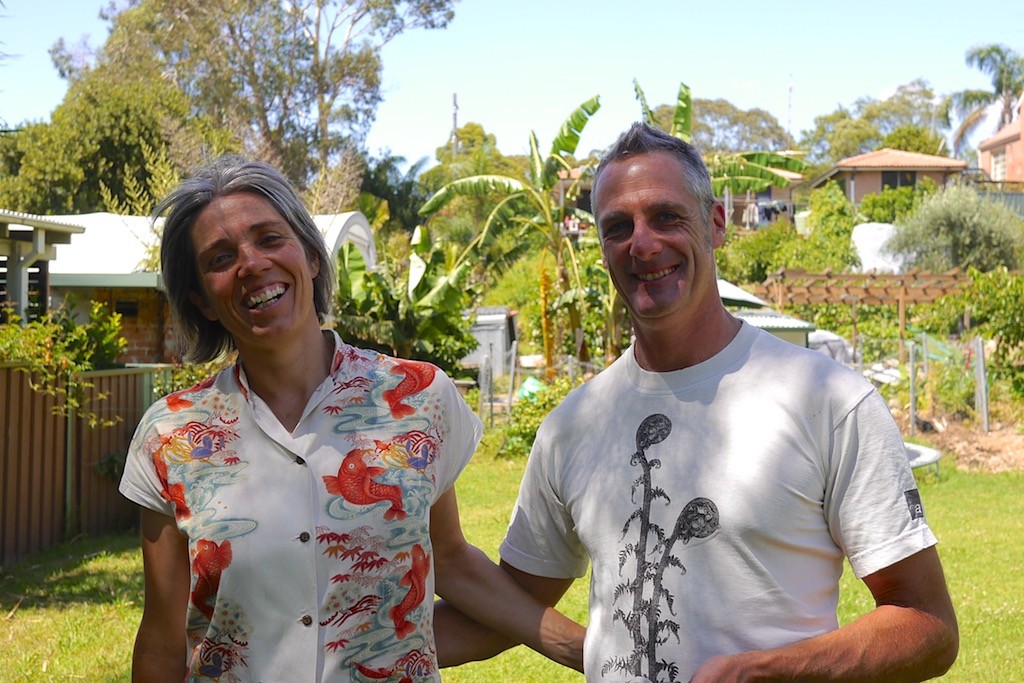
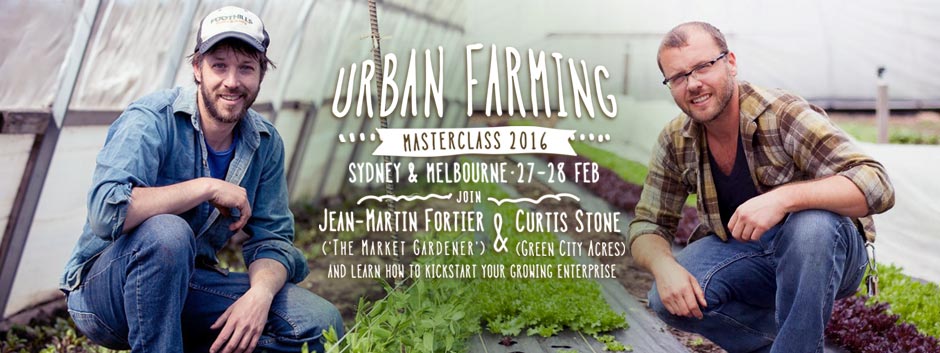
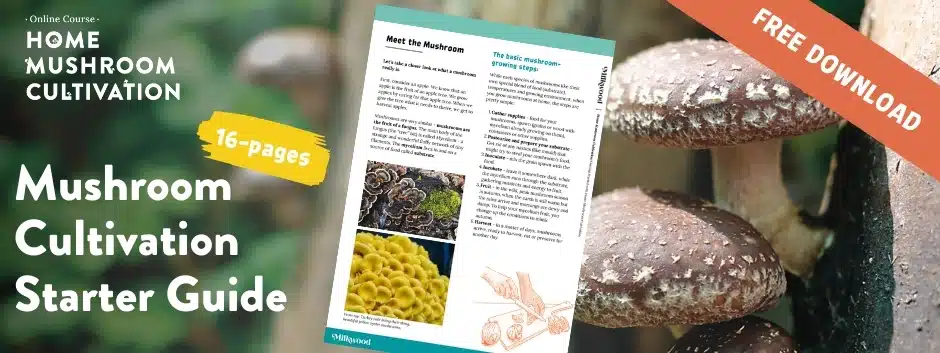
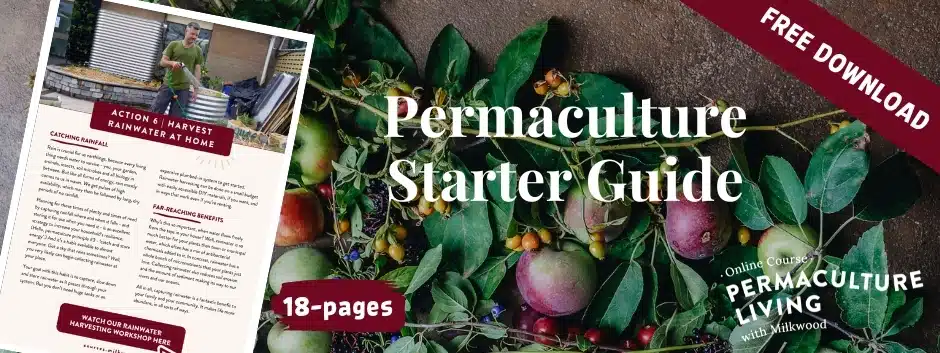
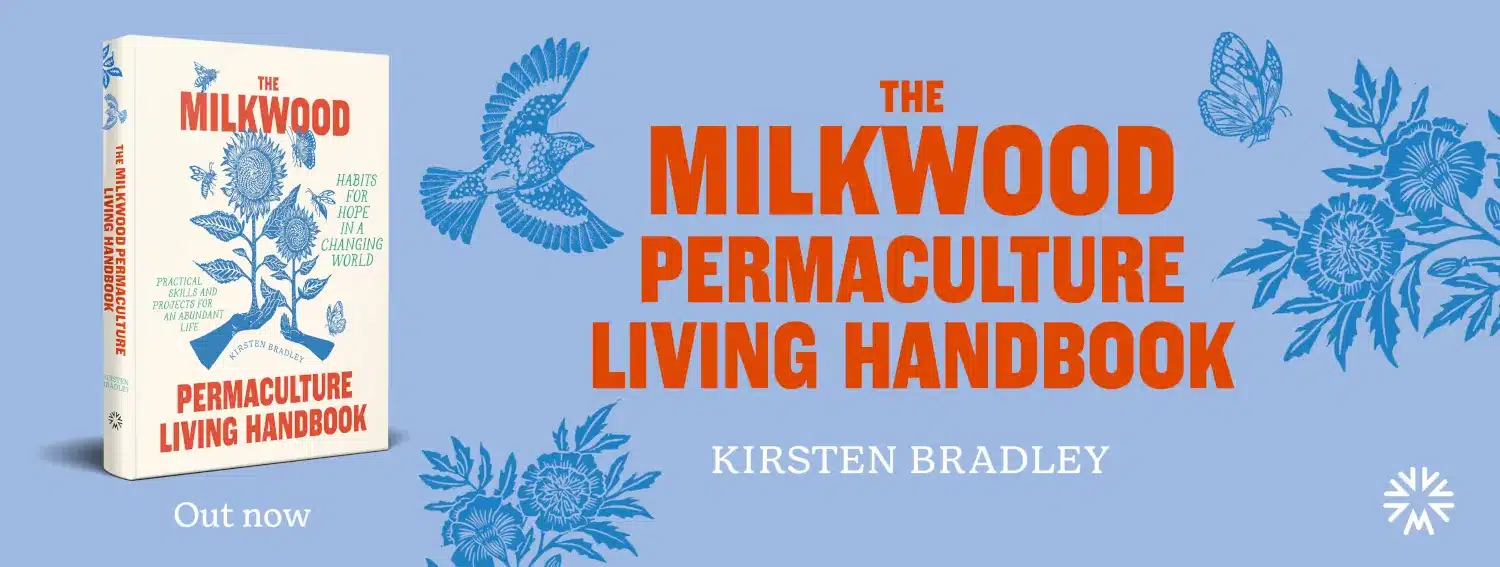
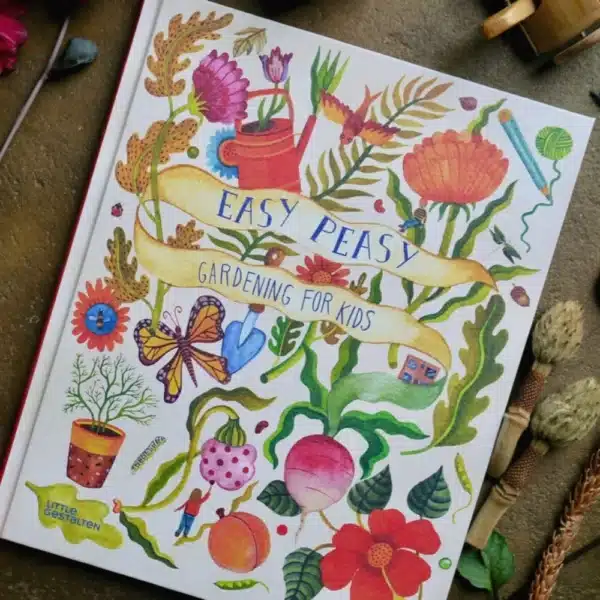
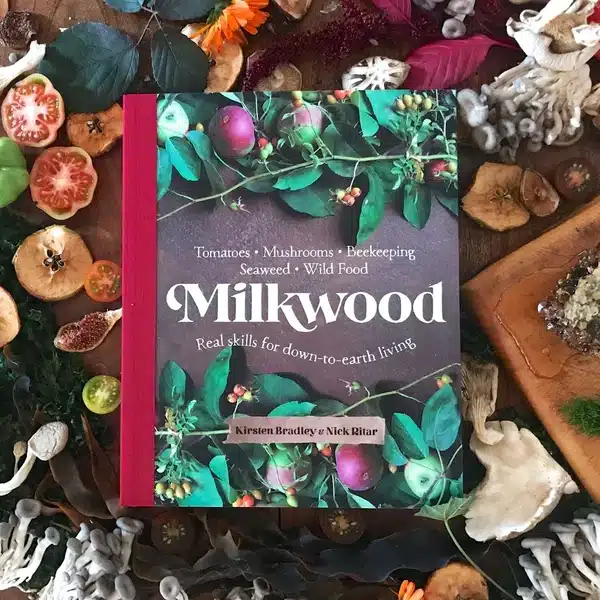
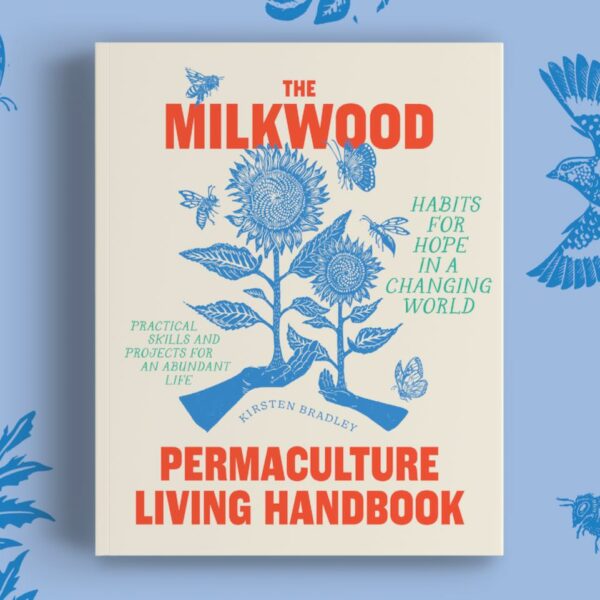






Composting helps in urban farming.You can use your kitchen waste for composting and use it for your suburbs.Great article by the way.Thanks for sharing.